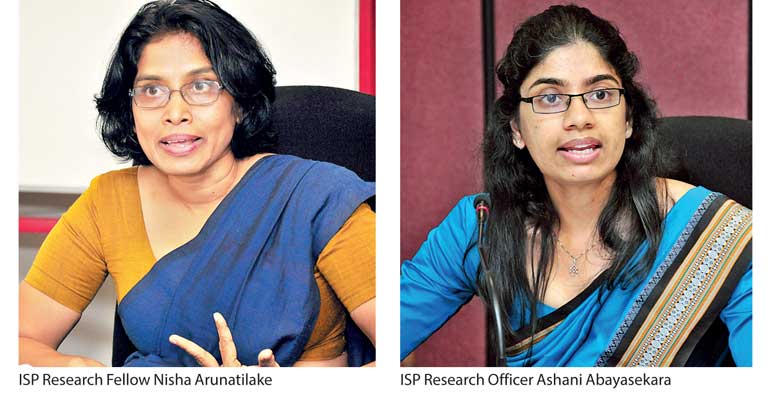Sunday Feb 22, 2026
Sunday Feb 22, 2026
Wednesday, 29 November 2017 00:00 - - {{hitsCtrl.values.hits}}
 By Himal Kotelawala
By Himal Kotelawala
The Institute of Policy Studies (IPS) yesterday recommended allocating funds to expand teacher training at the university level, among other measures, to fill a gap in qualified and experienced teachers for Science and Mathematics in the public school system, with the objective of improving performance at the GCE Ordinary Level (O/L) exams.
Presenting their findings on a possible link between O/L performance and school resources, IPS researchers noted that there is indeed a demonstrably significant link between the two, particularly with regard to a lack in qualified and experienced teachers for the above subjects. The findings can be found in the IPS publication ‘Better Schools for Better O-Level Results in Sri Lanka’ authored by IPS Research Officer Ashani Abayasekara and Research Fellow Nisha Arunatilake.
According to the research (conducted using School Census data for the year 2016), Sri Lanka has a surplus of teachers at the national level, but there is a dearth in qualified and experienced teachers at both national and sub national levels, particularly in science, math and English, contributing to the less than satisfactory O/L performance in schools across the country.
In 2015, 45% of students who sat for the O/L exams failed or only conditionally passed the all-important hurdle due to failing mathematics. The lack in qualified teachers this statistic is attributed to, according to the research, is worst for mathematics, closely followed by science. Passing O/Ls remains a pre-requisite for most further education courses currently available in Sri Lanka including GCE Advanced Level.
Research Fellow Arunatilake said that one of the reasons for the status quo is that tertiary-level teacher training in Sri Lanka does not cater to the needs of the country’s education system, what with only two out of the 17 state universities housing Faculties of Education and only three with their own Departments of Education.
Drawing attention to the Government’s emphasis on improving STEM (science, technology, engineering and math) education at the university level in the Budget allocations for 2018, Arunatilake said that improving science and mathematics education at the school level is in need need of “urgent attention” when it comes to education reforms.
“The foundation for improving the skills of math and science in students start at the school level,” she said.
Abayasekara, who also spoke at the event, said qualified and experienced teachers are found in greater numbers in better, more prestigious schools, with far fewer teachers present in schools that aren’t as privileged.
A qualified teacher, as defined by the authors, is a teacher who holds a degree in a given subject or has received special training in teaching said subject. An experienced teacher, meanwhile, is one with a grade higher than Class 2-Grade II.
According to IPS, teachers are usually recruited to Class 3 of the teacher service. Only those with a degree in education are directly recruited to Class 2-Grade II. Those who have been recruited to Class 3, depending on their initial recruitment, need to obtain three to five years’ experience in teaching and pass the efficiency bar exam to be promoted to Class 2-Grade II. IPS noted that this suggests that all Class 2 teachers are with subject and pedagogical knowledge as well as at least three years of experience.
The researchers measured teacher adequacy by contrasting the available teachers with the number of teachers recommended by the Ministry of Education.
The number of teachers in privileged schools, according to IPS, exceeds the number of recommended teachers, while underprivileged and low-achieving schools did not have enough teachers, leading to an inequitable allocation of teachers.
According to Arunatilake, the number of teachers who mostly teach English, maths and science are more than the number recommended by the Ministry in its first circular for 2016, with the largest surplus (3,055 more teachers than required) seen for the subject of English. However, she reiterated, there is a large shortage of qualified teachers (both novice and experienced) for mathematics and science that is apparent in all provincial schools. Shortages of English teachers exist in the Northern, Eastern, North Central, Uva and Sabaragauwa provinces.
Among the other findings were that schools where teachers have a higher tendency to take leave, showing a low level of commitment, perform worse at O/Ls than schools where the opposite is true.
Abayasekara also highlighted that O/L performance is significantly lower for both smaller schools and 1C and Type 2 schools.
There are five school categories in Sri Lanka: from highly privileged to highly underprivileged. According to Abayasekara, the most prestigious category is 1AB, with classes from Grade 1 to 13 and A/L classes offering courses in all three streams: Art, Commerce and Science.
1C schools also offer 13 years, but without science subjects for A/L. Type 2 schools terminate after O/L, while Type 3 terminate after Grade 5 or 8. “Highly privileged schools outperform all other categories, with 1AB doing much better than 1C and type 2,” she said.
Schools that report the best O/L results have more than adequate numbers of mathematics teachers, while “very poor” performing schools face teacher shortages. Some 44% of teachers are both in-field (teachers with a degree in their specific subject or with special training to teach that subject) and experienced in “better” schools, but non-in-field and inexperienced in schools considered inferior.
According to the study, schools managed by highly qualified and experienced principals also perform much better than schools overseen by those less qualified. Apart from expanding the tertiary education sector to produce more education degree holders, the authors recommended taking measures to improve pre-service teacher training programs and a more systematic approach to teacher recruitment to counter the inequitable allocation of teachers. –
Pix by Lasantha Kumara